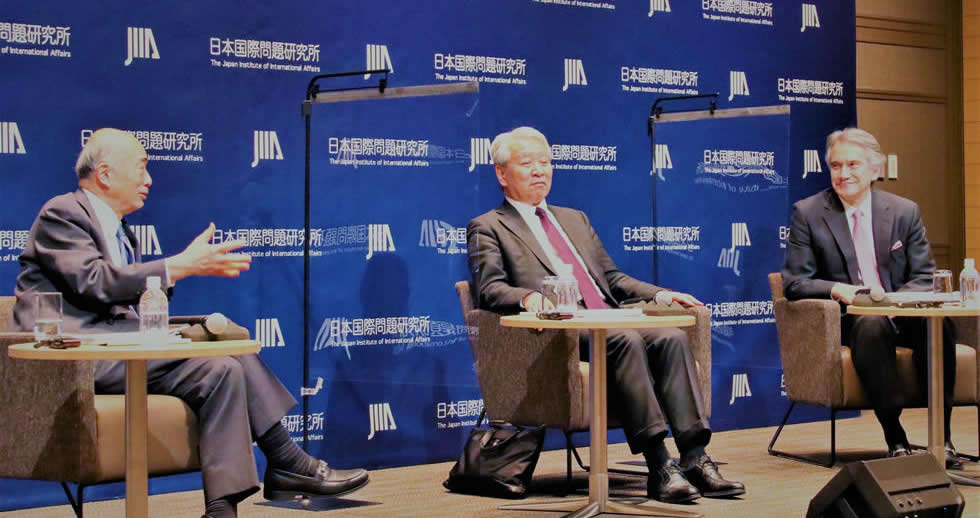The 2nd Tokyo Global Dialogue was held online from February 25 to 27, 2021 under the theme "The Indo-Pacific of Today and Tomorrow: Transformation of the Strategic Landscape and International Response". A total of 64 speakers took part from 19 countries and one region (see speakers list), and 12 thematic and regional sessions were held (see the summary and video of each session).
The discussions at the Dialogue centered around the intensifying US-China confrontation and strategic competition, its consequences for the Indo-Pacific region, and possible policy choices for Japan, other countries in this region and the international community in facing the strategic transformation. The debate covered a wide range of subjects, and below is a brief list of some of the points discussed.
--US-China relations are expected to remain tense, and may deteriorate even further over issues such as human rights. The tensions are considered to be structural, and could intensify in the next two decades during which China's GDP is expected to catch up and even surpass that of the US. The possibility of US-China cooperation on global issues such as climate change is recognized, but its positive impact on overall bilateral relations may be limited.
--There are diverging views on the nature and root causes of the US-China strategic competition, including its ideological aspect. It has been variously attributed to the economic/military power balance shift and China's challenge to the existing order; China's political regime, in particular the issue of communism and the Chinese Communist Party; and the rise of the Chinese economy based on a combination of authoritarianism and capitalism.
--Both the US and China consider the other side to be increasingly provocative. Such opposing views are also reflected in how they interpret the Free and Open Indo-Pacific (FOIP) and the QUAD--the cooperation framework among the US, Japan, Australia and India. From the US point of view, these initiatives are in response to China's policies and actions; China believes they are meant to preserve US strategic superiority in the region.
--Escalation of the US-China confrontation is foreseen in the Western Pacific, the South China Sea, and especially around Taiwan. The exacerbation of such a confrontation into a real military conflict should be avoided. It is important to revitalize US-China dialogue and consultations on crisis management, risk reduction, and confidence building.
--There is a sense of urgency based on the concern that the risk of nuclear weapons being used is the highest since the end of the Cold War. The major powers need to take the lead in restoring the multilateral arms control system.
-- US-China relations regarding technology could have aspects of competition and cooperation. Supply chain risk, as well as democracy and human rights from the perspective of data security, are important issues in this regard. However, the current geo-technology competition between the US and China may not necessarily reach a state of decoupling or Cold War 2.0.
--Regarding the great powers' influence in Southeast and South Asia, there are risks of further decoupling in this region, with dependence on China economically and on the US security-wise. The multipolar dynamic of this region is important and regional cooperation needs to be enhanced to maintain stability. ASEAN centrality may face questions of efficacy in responding to specific challenges, but it has been contributing to long-term stability.
--European countries' interest in the Indo-Pacific is growing, but Europe's position as a security actor in this region is not clear. Striking a balance between normative values such as human rights and economic interests in relation to China poses a serious challenge. Strengthening cooperation among democratic states is important, but questions such as how to go beyond the symbolic and what format would be most effective for operationalizing the cooperation--the FOIP may be too broad as a notion, while the QUAD is clear-cut--will need to be answered.
--Russia opposes the FOIP as a policy of containment against China and itself. Russia is trying to counter this by promoting its own "Greater Eurasia" concept and "Pivot to the East", but the tangible outcomes of these policies in Asia remain to be seen.
--The Middle East faces its own strategic issues with the shifting positions of recent US administrations. The American presence in the region has declined, reflecting its shift to Asia. The Biden administration's reengagement with Iran, especially on the JCPOA, is being closely watched, with views in the region divided.
--While multilateralism is facing a crisis, it is important to build upon the examples of functioning cooperation on the ground in response to the pandemic. On climate change, the early actions of the Biden administration are encouraging, but achieving the Paris Agreement goals will be extremely challenging.
--In Northeast Asia, the situation surrounding North Korea may be somewhat stable for the time being, but it may become more volatile if left unattended. Tensions are rising around Taiwan and the East China Sea, where China is employing complex and sustained approaches in its attempt to change the status quo. Coordinated and strategic responses, through military as well as political means, are needed.
--The shifting strategic landscape is having an impact on territorial and maritime issues and the rule of law in the region. China continues to unilaterally challenge the status quo in both the East China Sea and the South China Sea. Cooperation among countries upholding shared values such as the rule of law is needed.
--In response to the strategic transformation, cooperation among democratic countries, including those outside the Indo-Pacific region, is essential. The importance of rules-based and open multilateralism--such as the FOIP and QUAD--is emphasized, and Japan's role in promoting this is highly appreciated. Japan is also trying to manage US-China relations through the double-track of competition and cooperation. Japan is trusted and expected to take the lead in cooperation that transcends the US-China confrontation, in particular at multilateral fora such as the G20.
→ See the summary and video of each session.
→ See the website of the 2nd Tokyo Global Dialogue.



